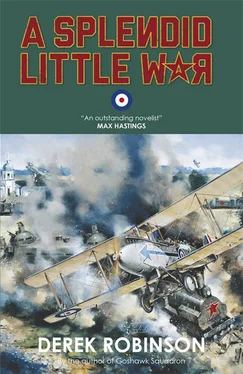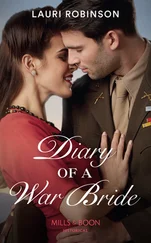Wragge drew sketches of an interception. He closed his eyes and imagined the sequence of events, again and again. Always the Camels were too fast, always they had too little time. An idea presented itself so clearly that it had obviously been waiting patiently to be summoned from a corner of his brain.
He sent for Jessop and Borodin.
“See what you think of this,” he said. He had a sharp pencil and a fresh sheet of paper. “Here we are, high, lurking in the sun. Some Bolo machines appear below us, here. We let them fly on, and then we follow after them and dive, not at the enemy but behind him. Two or three hundred yards behind, where he’s still unlikely to see us. We continue with the dive until we’re below them and going in the same direction, and we pull out, use our speed to climb hard, bloody hard, almost vertically, so we’re pointing at their bellies. As we stall, we fire. Or, if you prefer, we fire as we stall. And keep firing as they fly through our bullet-stream. Then we fall out of the stall and the enemy, we hope, falls to pieces.”
“And he never even saw us,” Borodin said. “In theory.”
Jessop traced with his finger the final part of the Camels’ dive and their climb into a stall. “That’s the trick,” he said. “Getting that bit right.”
“Distances are crucial,” Borodin said. “If we dive too far behind the target we might not catch it because it’s flying away. Dive too near and we might climb and overshoot it. This distance…” He took the pencil and drew a line from the start of the climb to the stall. “That must be exactly right.”
“We’ll practise,” the C.O. said. “The Nines can be Bolos.”
It took a long day’s work to find the right formula.
The Nines cruised at four thousand and the Camels attacked from five thousand, sometimes more. Wragge experimented with angles and speeds of dive and distances of climb. Sometimes the Camels stalled too soon. Sometimes they stalled at the right height but the Nines were no longer there.
They landed, ate lunch, and went up again, this time to eight thousand for the Nines and nearly ten for the Camels. Here the air was thinner and every action had to be adjusted. But at 3.45 p.m. they made the perfect, speedy, unseen interception and all three Camels hung in the air, aiming at the silhouettes of the Nines close above them, and then fell away. Everyone landed. Wragge had his formula in his head.
He knew it wouldn’t last. Combat without violence was a nonsense, and violence had a way of making fools of planners. And the enemy wouldn’t cruise up and down as placidly as Tusker Oliphant’s Nines. But Merlin Squadron had not performed well lately, indeed not since Griffin vanished in a fit of futility; and Wragge wanted to do something they could all feel proud of.
They had tea. Chef had baked muffins, which were ideal with the Gentleman’s Relish that Lacey had found in the bottom of a crate of tinned marmalade.
A locomotive arrived, pulling nothing but carrying a lieutenant from Denikin’s staff. The squadron’s aid was requested. The White advance had been checked at a river between Orel and Tula, where the Red Army presented an unusually strong defence. Denikin’s armies would attack, of course, and scatter the enemy, an excellent opportunity for ground-strafing and bombing. A suitable landing field had been identified, six miles behind the lines. It was unmistakeable: three large flags had been erected in the middle of the field.
Wragge thanked the lieutenant, asked him to have the flags reerected at the edge of the field, and said he hoped to arrive before sunset. The locomotive carried the lieutenant back to the battle.
*
Next morning it rained, the first interference with Wragge’s formula. Cloud, as grey and woolly as an old blanket, didn’t help either: it shut out the sky at two thousand feet.
The ground crews tested the engines, mopped out the cockpits, kept the bombs and bullets in the dry until ordered to arm. Everyone could hear the battle, rumbling away, six miles to the north. The adjutant listened. “Heavy artillery,” he said. “Red or White, impossible to say. Maybe both. God help the Poor Bloody Infantry.”
Wragge and Oliphant sat over a pot of coffee in The Dregs. “This muck isn’t going to clear,” Wragge said. “Even if it does, your target must be the Red big guns.”
“They’ll chuck all kinds of filth at us, there’s no escaping that. I mean, I hope to hell we do escape. Where will you be?”
“Upstairs as usual. On guard duty.”
Oliphant looked at the raindrops hurrying down the window. “We’ll make one run and hare for home,” he said. “And if any Nine gets shot down by Denikin’s idiots I shall be very cross.”
An hour later they were all in the air, the Nines leading the Camels, everyone just skimming the cloud base. The battle lines were obvious, despite the rain: the flash and smoke of many artillery pieces, the massing of troops behind what were probably fords in the river, cavalry lurking, shell craters appearing in a burst of smoke: it was the same on either side of the river. This was the biggest clash of arms the squadron had seen since Tsaritsyn. As the Nines crossed the river, Oliphant took his Flight up into the cloud.
Wragge cruised on. The cloud base was far more ragged than it seemed from the ground, and the Camels buffeted through these thick tatters. Ground fire contributed a scattering of hopeful ink-blots but the guns couldn’t find the height and they soon gave up. Windscreens were opaque with rain and the pilots didn’t even bother with goggles. All that mattered was the steady, friendly roar of a Le Rhône rotary.
Wragge kept an eye on the time. After two minutes, as planned, the Nines reappeared, widely scattered as he knew they must be. They flew a wide half-circle while they formed up in line astern. Oliphant began the long dive towards the Red positions. The Nine was a heavy biplane and heavily loaded with bombs. Weight and height combined to build speed to its maximum. Oliphant hoped it would see his Flight safely home.
The Camels watched. No Red aircraft were in sight. Not surprising. How could the enemy know exactly when the Nines would raid? But gunners on the ground, heavy-machine-gunners, light artillery, had ample time to see the line of Nines, flying fast but getting lower, and just as Oliphant knew they would, they chucked all kinds of filth at him.
His head was out in the stinging gale of rain, his eyes clenched to slits, trying not to blink as he searched for big guns worth bombing. He saw a battery off to his left just as it fired, and he jinked the Nines to correct their approach. He dropped his whole load in one thankful happy high-explosive goodbye and enjoyed his bomber’s little leap of relief, and zigzagged out of this madhouse.
Wragge waited until all the Nines had bombed and he climbed into the cloud.
It was mysterious stuff, grey and gloomy, seemingly shapeless but populated with swirls and gusts that made an aeroplane drop or bounce or swerve. Some pilots hated cloud, refused to believe their instruments, feared that the cloud would never end, panicked and dived to escape. Sometimes they fell into clean air upside-down and hit a hilltop before they could recover their wits. Wragge knew that trust was the only way to beat cloud. Trust the instruments, trust the altimeter, trust the fact that he’d done it before and it worked. He ignored his senses and his Camel burst into a dazzling world of sun and an outrageous amount of blue sky.
Jessop and Borodin followed, nowhere near him. They came together and searched the sky. Empty. They were at three thousand five hundred. Wragge took them up until he knew their propellers were clawing at the air, just short of ten thousand feet above an earth lost below cloud so white and so widespread that it defeated the eyes.
Читать дальше











